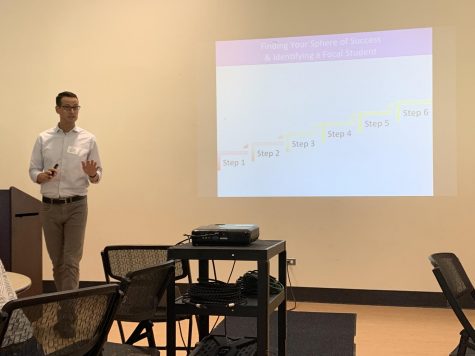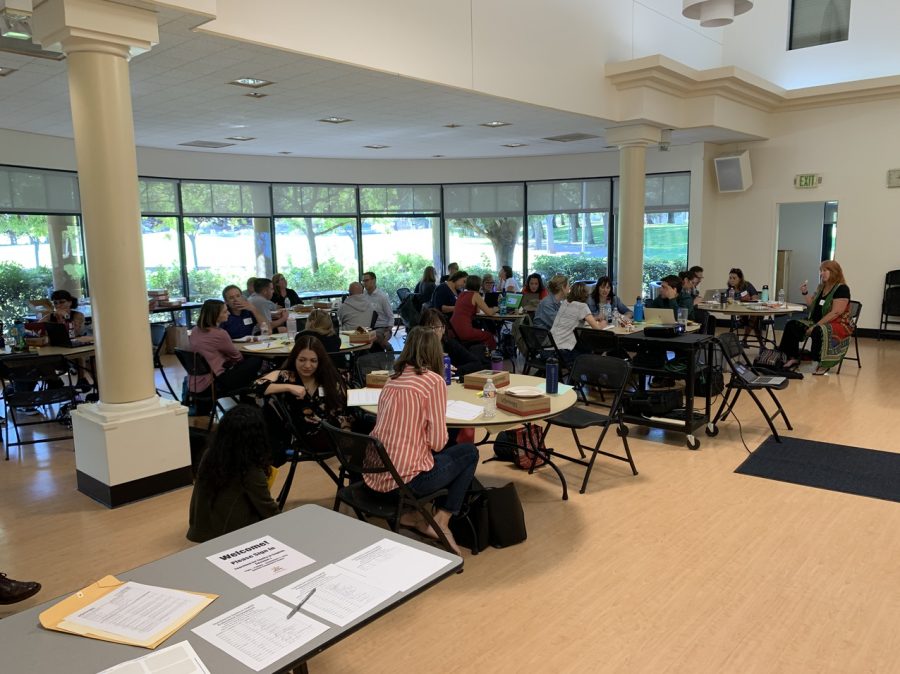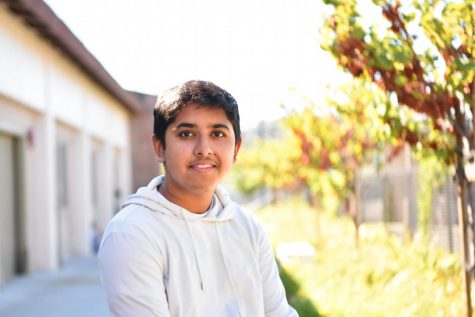English teachers come together to promote equity in classrooms
English teachers of FUHSD attend sessions in order to learn how to help their students in a way that benefits them
Julia Satterthwaite | Used with Permission
English teachers from all five FUHSD high schools gather at the Quinlan Community Center to learn about equity and social justice in their classrooms
October 21, 2019
To promote equity and social justice in everyday English classrooms, FUHSD English department curriculum lead and Cupertino High School (CHS) English teacher Greg Merrick began training FUHSD literature teachers at the first of four afternoon sessions on Sept. 11 at the Quinlan Community Center. The course will continue on Nov. 19, Jan. 22 and March 19 at the new FUHSD professional development space.
When coming up with the training course — Teaching for Equity and Social Justice in English Classrooms — Merrick explored ways to inspire teachers to help their students in a way that might benefit them more.
“Taking a look at student performance data, we can see there is some percentage of students who are not yet performing at the level we would expect of them,” Merrick said.
Merrick began brainstorming ways in which teachers could change in English classrooms to help these groups of students improve their performance. He had attended an equity conference over the summer in New York, so he decided to spread this knowledge with his colleagues at FUHSD.
“A lot of teachers and administrators expressed a lot of interest in learning more about how we can make sure all students are learning at a high level,” Merrick said. “Our district as a whole has been thinking about ways we can create more equitable environments for all students.”
MVHS literature teacher and English department lead David Clarke enjoyed attending Merrick’s first training session.
“I think Mr. Merrick is a great facilitator for something like sessions,” Clarke said. “I think he did a good job, because each one of the high schools have different sorts of issues around social justice and equity and different ways of sort of approaching [this].”
Clarke describes the way that Merrick taught the session and thinks that there is a different angle of looking at equity and social justice that Merrick perfectly highlights.
“[Thinking about] first of all, who we are as teachers thinking of our own identity, but then flipping it over and starting to think about who are our kids, because equity and social justice is really about giving the kids what they need, you have to understand who your kids are,” Clarke said. “And the kids at [MVHS] are going to be different than the kids at Fremont, who are different than the kids in Cupertino. We need to understand them and figure out their needs to give them what they need. So we did a really good job kind of focusing it that way.”
Another MVHS teacher who attended this session was English and journalism teacher Julia Satterthwaite. Satterthwaite was already passionate about equity, and thought that this offering catered to exactly what she wanted to learn more about.
“At some sites, maybe [equity is] about offering equal opportunities for kids who maybe are from different socioeconomic backgrounds,” Satterthwaite said. “And we have some of that amount of it. But also our equity issues here, a lot of them have to do with things like race, or things like sexual orientation, where people are made to feel less than because they’re a minority on our campus.”
While this is a great help to the teachers, according to Clarke, many hours of hard work go into preparing for each individual session, and the process is split into different parts. Merrick approximates that for each hour of the session, 20-30 hours of preparation are involved, which includes spending time with teachers, trying out some ideas and developing handouts and activities.
Merrick hopes that this course will have a positive influence at all FUHSD schools by helping teachers promote social justice and equality in their classrooms.

Cupertino High School (CHS) Literature teacher and English Curriculum lead for FUHSD Greg Merrick teaches steps to finding success, and tells teachers to identify a “focal student” to work with. This was a part of Merrick’s ideas to promote equity in classrooms.
“I hope for a couple of things,” Merrick said. “One of them is that our literature that we teach doesn’t represent the diversity of the students that are present, so I hope to see less of old dead white guys in our classrooms. In terms of writing, like providing students with opportunities to engage in rigorous writing tasks that are authentic, such as thinking about writing that adults do in the real world, and not just in literature.”
Even though this offering was well received by the teachers at the session, Merrick plans to improve as they progress.
“One thing I ask the teachers to do at the end of every session is to give me feedback on to what extent they learned what I told them they were going to learn, and what worked well,” Merrick said. “I sometimes even get follow up emails about the lesson. This course has been broadly successful, and I got a lot of good feedback, so we can go a long way.”




























